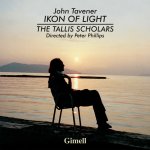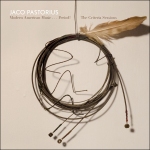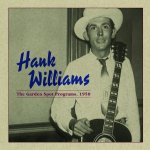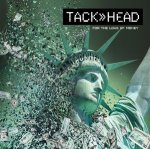PICK OF THE MONTH
 Carl Philipp Emanuel Bach
Carl Philipp Emanuel Bach
Carl Philipp Emanuel Bach Edition (compilation; 30 discs)
Various performers and ensembles
Brilliant Classics (dist. Naxos)
94640
2014 marks the tricentenary of C.P.E. Bach’s birth, and has produced the expected bumper crop of celebratory releases (watch for coverage of another boxed set next month). But none so far matches this monumental and budget-priced compilation of previously-issued material. Its 30 discs do not contain the entirety of Bach’s output as a composer, but there is as much here as most library collections could possibly need: three discs’ worth of symphonies, six of concertos, six of ensemble chamber music, six of sacred vocal music (including both songs and oratorios), and nine of keyboard works. The soloists and ensembles include the Kammerorchester ‘C.P.E. Bach,’ Musica Amphion, the Scottish Ensemble, the Rheinische Kantorei, Pieter-Jan Belder, Andrea Chezzi, and Collegium Pro Musica, some of whom play on modern and some on period instruments. As is usually the case with this kind of collection, some of the recordings are quite old — a few date from the mid-1980s — but most were made within the last three years. The performances are very good, the music is a consistent delight, and my only quibble is with the packaging: the box itself is a bit too big for a clamshell design, and the accompanying information is inexcusably thin: an eleven-page booklet provides very general information about C.P.E. Bach’s work and hardly any detail about any of the individual pieces. There is no information at all about the performers and ensembles beyond their names on the back of each individual disc sleeve. (A somewhat more detailed 32-page version of the booklet, including all sung texts, is available online — but why no further details about the performers, and why not include this version in the box?) Still, the quality and significance of this music, the bargain-line price, and the convenience of having so much excellent music in such a small package make this set a must-have for all classical collections.
CLASSICAL
 Johann Michael Haydn
Johann Michael Haydn
Complete Wind Concertos, Vol. 1
Salzburger Hofmusik / Wolfgang Brunner
CPO (dist. Naxos)
777 781-2
The acid test for any period-instrument recording of a wind concertos collection like this is always the horn concerto: modern French horns are notorious for the technical demands they place on their players, and the natural (i.e. valveless) horns of the 18th century are far worse: even when played expertly they often sound watery and unstable. In this case, soloist Johannes Hinterholzer acquits himself admirably on the piece presented here, though the tension is audible. The concertos for clarinet, trombone, flute, and trumpet are less stressful, and the Salzburger Hofmusik chamber orchestra is wonderful throughout. And, of course, this disc is recommendable simply because it brings more attention to the work of Franz Josef Haydn’s brilliant but underrecognized younger brother. Recommended to all classical collections.
 John Tavener
John Tavener
Ikon of Light (reissue)
The Tallis Scholars / Peter Phillips
Gimell (dist. Harmonia Mundi)
GIMSE 404
The death in late 2013 of John Tavener has, inevitably, prompted renewed interest in his music. This disc brings together two previously-issued recordings of Tavener’s music made by the Tallis Scholars: Ikon of Light was commissioned by the group and this performance (along with the shimmeringly lovely Funeral Ikos and The Lamb) was originally recorded in 1984; for this reissue, the program is augmented by a 1982 recording of the Great Canon of St. Andrew of Crete. The lyrical content and compositional style of these pieces reflect Tavener’s conversion to Orthodox Christianity, and constitute a mini-movement in the mid-1980s that came to be called “sacred minimalism” (the other great exponent of which is Arvo Pärt). Tavener has a strong cult following, and any library that does not own the original release of Ikon of Light should seriously consider picking up this reissue.
 Felix Mendelssohn; John Adams
Felix Mendelssohn; John Adams
Violin Concertos
Chad Hoopes; MDR Leipzig Radio Symphony Orchestra / Kristjan Järvi
Naïve (dist. Naxos)
V 5368
Here’s an interesting pairing: Mendelssohn’s second violin concerto (a pillar of the Romantic repertoire, the third movement of which is built on one of the most familiar and beloved melodies of the 19th century) alongside John Adam’s spikily modernist late-20th-century violin concerto. The program makes more sense when you realize that part of the point is to establish the impressive stylistic range of 19-year-old violin virtuoso Chad Hoopes, who is just as convincing delivering the swooning emotional immediacy of Mendelssohn as the sharp intellectualism of the Adams. His playing is indeed remarkable, and the album as a whole is deeply satisfying. Recommended to all classical collections.
 Kawai Shiu
Kawai Shiu
For Loss
Ablaze (dist. Albany)
ar-00012
So I have to say that in general, I’m not a huge fan of conceptual art. It’s not that I object to it in principle; it’s just that I usually find that the more important the concept behind the art is, the less important will be the aesthetic impact of the art, and the result is usually art that is ideologically tendentious and ultimately boring. This applies whether the art in question is visual or musical. Kawai Shiu’s work for “prepared condemned piano” is deeply conceptual in nature — it was written in the wake of the 2011 Japanese tsunami and is designed both as a “contemplation of horror and tragedy” and as a symbolic act, using a partially-destroyed piano prepared with mechanical treatments in the style of John Cage — but it’s also sonically interesting and engaging. Using a variety of percussive, bowed, and conventional keyboard techniques, Shiu coaxes a huge range of sounds from his instrument and effectively communicates a sense of loss and tragedy while also making music that is both intellectually and aesthetically engaging.
 Muzio Clementi
Muzio Clementi
Piano Sonatas
Ian Hominick
MSR Classics (dist. Albany)
Muzio Clementi is one of those composers everyone has heard of (everyone who ever took a piano lesson, anyway), but relatively few have really listened to. He remains most famous as a pedagogue, but his compositions are complex, demanding, and often startlingly beautiful, and exemplify the best of the classical style. Ian Hominick is a powerful advocate for these sonatas, which he plays on a modern Steinway. The recorded sound is rich and clear, perfect for these jewel-like pieces.
 Richard Wagner; J. Peter Schwalm
Richard Wagner; J. Peter Schwalm
Wagner Transformed
Intergroove Classics (dist. Allegro)
IGC012-2
As someone who has never found most of Wagner’s music listenable, I was intrigued by the title of this album. And indeed, it’s really pretty fascinating: instrumental selections from the operas Parsifal, Tristan & Isolde, Tannhäuser, and Der Ring des Nibelungen are reimagined and remixed using a variety of acoustic and electronic instruments. Sometimes you hear only a solo acoustic piano; at other times you hear radically abstracted electronic soundscapes whose relationship to the source material is difficult to detect. Throughout the program, the mood is fairly gentle, though at certain points it is disquietingly dark and eerie. This is a fascinating take on the work of one of classical music’s most difficult geniuses.
 Franz Ignaz Beck
Franz Ignaz Beck
9 Symphonies (reissue; 3 discs)
La Stagione Frankfurt / Michael Schneider
CPO (dist. Naxos)
777 880-2
Rick’s Pick
Franz Ignaz Beck may not be a household name today, but as this collection of nine symphonies makes clear, he deserves to be. As the baroque period gave way to the classical, he was already introducing elements of orchestration and harmonic development that would not become widely practiced until decades later. These three discs (featuring period-instrument performances by the excellent La Stagione Frankfurt under conductor Michael Schneider) were originally issued separately between 1996 and 2006; those discs are simply boxed together in their original jewel cases for this reissue. The performances are very fine, and the wind players (whose parts are particularly central to Beck’s musical conception) are especially good. Any comprehensive classical collection that did not acquire these discs upon their initial release should quickly pick up this mid-priced reissue package.
 Giaches de Wert
Giaches de Wert
O mors, quam amara est: Motets, Book 1 (1566)
Collegium Musicum Amsterdam / Anthony Zielhorst
Brilliant Classics (dist. Naxos)
94684
Although born in the Netherlands, Giaches de Wert’s compositional style was heavily influenced by the Italians — at age 9 he was taken on as a choirboy at the court of Cardena near Naples, and he spent the remainder of his career in Italy, eventually settling permanently in Mantua (which would later be famous as the professional home of both Giovanni Gastoldi and Claudio Monteverdi). In the motets presented here you can hear the influences of both the Franco-Flemish masters who had flourished in previous decades and of Italian madrigals; sometimes those influences are integrated and sometimes you hear the music alternating between a more traditional (and Flemish) polyphonic style and an emerging (and Italian) polychoral approach. The singing is excellent and the music is consistently fascinating; recommended to all early music collections.
JAZZ
 Nels Cline Singers
Nels Cline Singers
Macroscope
Mack Avenue
MAC1085
The Nels Cline Singers play a kind of jazz I don’t particularly like (abstract, discursive) in a way that I really, really like, and I’m not quite sure how to reconcile that contradiction, nor am I sure that I need to. Understand, first of all, that the group name is a joke; there are no singers (though Cline, a guitarist and composer who spent ten years playing for alt.country pioneers Wilco, does use his voice in slightly bizarre ways from time to time). Also, you should know that while this music sometimes sounds scattered and crazy,it’s much more organized than it might seem at first blush. Cline is drawing on an enormous range of musical experience and taste, and you’ll hear hints of everything from psychedelic rock and downtown skronk to nightclub jazz and electronica. It won’t sound much like anything you’ve heard before, and that’s a compliment.
 Bumper Jacksons
Bumper Jacksons
Sweet Mama, Sweet Daddy, Come In
Self-released
No cat. no.
Rick’s Pick
If you miss the slightly punky 1930s-style hot jazz of the Squirrel Nut Zippers, then you owe it to yourself to check out the slightly countrified 1930s-style hot jazz of the Bumper Jacksons. This group’s sound draws deeply on driving pre-swing sounds but also on early string band music, Western swing and classic country — but by far the dominant element here is hot jazz, with Django-style rhythm guitar, group horn improvisations, and anachronistically chirpy female vocals (sometimes combined, weirdly and brilliantly, with steel guitar). It’s a pretty rare album that follows up “When the Sun Goes Down in Harlem” with “Darlin’ Corey,” and that’s part of what makes this one so much fun. Mostly, though, what makes it fun the sheer and unadulterated joy of the playing and singing. Highly recommended to all library collections.
 Chat Noir
Chat Noir
Elec3Cities
Rare Noise
RNR038
On paper, this looks like a more-or-less standard piano trio: pianist Michele Cavallari, bassist Luca Fogagnolo, drummer Giuliano Ferrari. Only when you notice that each musician is also credited with “effects” will you start getting an idea of what to expect, which is “jazz” only in the broadest sense: the all-original program consists of glitches, samples, arrhythmic ambience, abstract vocals, and unidentifiable elements that seem to come from another planet — as well as occasional passages of undeniably conventional jazziness. It’s all simultaneously very listenable and very strange. Recommended.
 Steven Kroon
Steven Kroon
On the One
Kroonatune
KTR 005
This is a wonderful album of Latin jazz played by a sextet led by percussionist Steven Kroon. The selections represent a mix of straight-ahead tunes (like the George Cables composition “Camel Rise”), American Songbook standards (actually only one: a lovely arrangement of “As Time Goes By”) and classic Latin numbers, all of them performed in Kroon’s signature style: a kind of complex but beautifully light and accessible approach that sacrifices none of Latin jazz’s typical dense rhythmic complexity but never leaves you lost or overwhelmed either. Most of us have had the experience of listening to Afro-Cuban jazz and being left wondering where the downbeat went — but (as this disc’s title suggests), Kroon is skilled at delivering complexity in a fully accessible way. Great stuff.
 Tyler Blanton
Tyler Blanton
Gotham
Ottimo Music
No cat. no.
Rick’s Pick
This is a highly unusual jazz album, though one whose attractions are pretty straightforward: Blanton is a vibraphone player and composer, and here he leads a quartet that includes bassist Matt Clohesy, tenor saxophonist Donny McCaslin, and drummer Nate Wood. The program consists of six rather long tunes, which range in style from jagged funk (“Never Sleeps,” “Gotham”) to impressionistic abstraction (“Freaky Dream”) and a kind of dry, almost Steve Reich-styled process structure (“Cogs,” “Tunnels”). Blanton favors sideways harmonic progressions and tightly-composed arrangements, and the whole thing is just really cool. Strongly recommended to all jazz collections.
 The Nest
The Nest
Sayweenjoy
Album Label
ALB003
How’s your tolerance for extremely weird jazz? Not extremely avant-garde, not forbidding or abrasive — just very, very weird. If you have a high threshold of weird, then definitely check this one out: the Nest’s most prominent recognizable instrumental voice is that of the saxophone, but the sax is constantly embedded in sounds that evoke mental images of a party being thrown by terminally-ill cyborgs with an irritable R2D2 tending bar. The melodies are sometimes jazzy, sometimes Middle Eastern, sometimes almost entirely absent; the beats are sometimes explicit and sometimes barely implied. The music is not always strictly musical. “More danceable than John Zorn, but clunkier than Madonna,” say the press materials. Yup. I love it, but then again, my threshold of weird is perhaps unusually high.
 Jaco Pastorius
Jaco Pastorius
Modern American Music… Period! The Criteria Sessions
Omnivore
OVCD-84
Rick’s Pick
That the late bassist Jaco Pastorius was a legend is trivially obvious; his virtuosity was unprecedented, and he single-handedly redefined the bass as a solo instrument and the electric bass as a jazz instrument. He was also a tragic figure, someone whose mental problems and drug habit led to his early death after a violent confrontation with a club bouncer. Issued in conjunction with a new documentary film, this album brings to light demo recordings made prior to the release of Pastorius’ first solo album and finds him in the studio working out tunes and arrangements that would later find their way (mostly in shortened form) onto that album: familiar compositions like “Opus Pocus,” the bop standard “Donna Lee,” and “Continuum” are here, and fans will be thrilled to hear them in these different versions. A must for all jazz collections.
COUNTRY/FOLK
 Hank Williams
Hank Williams
The Garden Spot Programs, 1950
Omnivore
101609
Rick’s Pick
Hank Williams is one of those country artists that I think most of us tend to take for granted. Then you hear one of his recordings again and your hair stands up on your neck again. That voice, those startling, even shocking, lyrics (“Did you ever see a robin weep, when leaves begin to die?/That means he’s lost the will to live”), that small and preternaturally tight band — to call Williams a “country” artist is almost inaccurate. During his inexcusably brief life he did something all his own. Anyway, this disc is a treasure: it contains four radio programs recorded in 1950 and never before commercially released. As usual, the jingles and the patter are silly and the songs are heavily weighted towards established hits. But there are obscurities here as well, and the sound quality is surprisingly good. No pop or country music collection should be without this disc.
 The Henry Girls
The Henry Girls
Louder than Words
Beste Unterhaltung
BU 045
Can it really be only two months since I recommended the Henry Girls’ last album? I guess so. And now here’s a new one, just as good. The formula hasn’t changed: they still make deceptively straightforward-sounding folk-pop behind which complex vocal harmonies and instrumental arrangements hide modestly, they still write deceptively ancient-sounding modern songs, and they still have a taste for startling covers (Elvis Costello last time, Bruce Springsteen this time). And you’d still never guess that they’re from Ireland. If you trusted me last time, you know that you need this one too; if you missed out last time, don’t miss out on this one.
 Bradford Lee Folk and the Bluegrass Playboys
Bradford Lee Folk and the Bluegrass Playboys
Somewhere Far Away
Five of Diamonds
(No cat. no.)
There’s a trick to making modern traditional bluegrass music: if your singing style is high-and-lonesome enough, if your instrumentation is strictly traditional, and if you can write songs with titles like “Trains Don’t Lie” and “Foolish Game of Love,” you can get away with some tricky chord progressions and artful lyrical turns. Bradford Lee Folk gets away with all of these things because no one is ever going to question his bona fides (he’s a full-time farmer — organic, but still — and the former front man for the well-respected bluegrass band Open Road), and also because he’s a flat-out great singer and songwriter — and because his band is tighter than a duck’s behind.
 Carlene Carter
Carlene Carter
Carter Girl
Rounder
11661-9184-2
Rick’s Pick
When your last name is Carter — and, of course, when you’ve established a respected 35-year career of singing and songwriting — there are certain people you can call on for help with a new album. Carlene Carter’s duet partners here include Kris Kristofferson and Willie Nelson; her session men include Greg Leisz (check out his sly “Wildwood Flower” quote on “Me and the Wildwood Rose”), Jim Keltner, and Don Was. And the music on this album is both a celebration of the Carter Family tradition, with several A.P. and Maybelle Carter favorites, and an expansion of it. Carter’s voice has acquired a bit of graininess over the years, and it works in her favor: this album is strong, personal, traditional, and modern; only a slightly ham-handed new version of “Gold Watch and Chain” disappoints. Strongly recommended to all country music collections.
ROCK/POP
 Hatti Vatti
Hatti Vatti
Worship Nothing
New Moon
NMNCD001
Rick’s Pick
Polish producer Hatti Vatti has made a name for himself on the European electronic music scene over the past five years by releasing a steady stream of dark, often dub- and dubstep-inflected tracks that draw on 80s electro-pop, film music, and techno. A recent EP was based on Middle Eastern field recordings. For his first full-length album, he has created enormous sonic fields through which massive basslines and wispy shards of keyboards float; voices enter the mix from time to time as well, sometimes almost unrecognizably (as on “Struggle,” featuring Sara Brylewska) and sometimes as delivery mechanisms for more-or-less conventional songs (as on “Wonderful World,” featuring Cian Finn). This is one of those rare and wonderful albums that manages to be simultaneously relaxing and unsettling. Highly recommended to all pop collections.
 Paul Carrack
Paul Carrack
Rain or Shine
Carrack-UK
PCARCD22
Back in the 1980s, Paul Carrack did a stint with Squeeze that resulted in what I personally believe was that group’s strongest, catchiest, and most soulful single (“Tempted”). Before and since, he has performed with other bands (notably and most successfully with Mike and the Mechanics) and as a solo artist, and his latest finds him playing most of the instruments on a mixed program of originals and soul classics including “(If Loving You Is Wrong) I Don’t Want to Be Right” and “You Don’t Know Me.” The arrangements are brilliant — many include either strings, a horn section, or both — but the real star of this show is Carrack’s voice, which is as rich, clear, and strong as it’s ever been. The over-40 crowd will want to hear this one based on nostalgia, but hand-sell it to your younger patrons; no fan of classic pop music will fail to be entranced.
 Tackhead
Tackhead
For the Love of Money
Dude/Echo Beach
DR109b
The core of Tackhead (also rendered as TACK>>HEAD) has existed since the earliest days of hip hop, when drummer Keith Leblanc, bassist Doug Wimbish, and guitarist Skip MacDonald served as the house band for the now-legendary Sugar Hill Records. Since those days, the trio has been involved in a variety of other projects both separately and together, Tackhead being one of the most notable: its sound combines old-school funk with avant-garde dub (the group has a longstanding relationship with On-U Sound’s Adrian Sherwood), and you’ll hear plenty of both on its latest album: “Loose Booty” channels classic P-Funk, “Black Cinderella” features Bernard Fowler on a slab of classic lovers rock; the title track recycles an evergreen soul-protest number. Great stuff, as always from this crew.
 Yair Elazar Glotman
Yair Elazar Glotman
Northern Gulfs
Glacial Movements
21
You can kind of tell that Yair Elazar Glotman is a bass player — he has that fascination with deep, sustained sawtooth-wave sounds that tends to drive people to spend a lot of time playing an upright bass with a bow. The sounds that he has sculpted for this album, though, are much more complex than that: although these electroacoustic pieces define large and deep sonic spaces, those spaces contain microscopically tiny details — and although they tend to seem relatively static on the surface, they’re not actually static at all. Listen carefully, and you’ll be rewarded. (Listen on headphones with the volume up and you’ll be rewarded even more.)
 Millie & Andrea
Millie & Andrea
Drop the Vowels
Modern Love (dist. Forced Exposure)
LOVE 094CD
If you prefer to have your dark, glitchy, bass-centric electronic music delivered in a somewhat more danceable envelope, then consider this grittily engaging effort from Millie & Andrea (a.k.a. Miles Whittaker and Andy Stott — get it?). Here the ambience is tighter and more compressed, but still rich and varied; the rhythmic structures are much more defined — tend to be explicitly funky, in fact — and the clicks and glitches that ornament the generally bassy soundspace are organized around beats that vary in flavor from techno to jungle. This is great stuff, by turns grumpy, joyful, and jittery.
 Pearlfishers
Pearlfishers
Open Up Your Coloring Book
Marina (dist. Forced Exposure)
MA 077CD
Like Gart Greenside’s Scritti Politti, David Scott’s Pearlfishers traffic in deceptively pretty and lushly-orchestrated pop music. Well, actually, that’s not quite right: there isn’t really anything deceptive about the Pearlfishers’ sound, no dialectical materialism lurking beneath the gentle vocals and the candy-coated arrangements. What there is, though, is a richness and a structural complexity that you can easily miss if you focus only on the pretty surfaces. There’s also an existential melancholy to the lyrics that is equally easy to miss if you aren’t paying attention. Recommended.
 Arto Lindsay
Arto Lindsay
Encyclopedia of Arto (2 discs)
Northern Spy (dist. Redeye)
NS 055
Rick’s Pick
Arto, Arto, Arto. No question, the man’s a genius: a pioneer (with DNA and the Golden Palominos) of the downtown No Wave scene in the late 1970s, later a pioneer of avant-bossa-nova and of subversively weird electro-pop (as a member of Ambitious Lovers), he is equally comfortable crooning romantic samba tunes and emitting sheets of hellacious noise from his notoriously never-tuned guitar. This two-disc set compiles a very nice program of some of his more accessible material on one disc (frustratingly, no information is provided about where these tracks originally appeared), and the second documents a hellaciously noisy solo performance at Pete’s Candy Store in 2012; the setlist includes a hilariously skronked-out rendition of Prince’s “Erotic City.” I give this a Rick’s Pick designation because it’s brilliant and because Arto has been a hero of mine for decades — but don’t expect much patron demand for this retrospective, great as it is.
 Snowbird
Snowbird
Moon
Bella Union
424
Do you miss Cocteau Twins? I know, me too. Well, there’s good news: former Twins guitarist Simon Raymonde has teamed up with singer Stephanie Dosen to create an album of dream-pop that, while not explicitly modeled on the Cocteau Twins sound, has an awful lot in common with it (check out, in particular, the heartbreakingly lovely and lyrically inscrutable “All Wishes Are Ghosts”). Throughout the album, layers of guitar shimmer evocatively, the vocals are mixed in such a way as to frequently obscure the lyrics, and the melodies are just gorgeous. Recommended to all pop collections.
WORLD/ETHNIC
 Ani Cordero
Ani Cordero
Recordar: Latin American Songs of Love & Protest
La Nana Music
No cat. no.
Ani Cordero was born to Puerto Rican parents and grew up in Atlanta and San Juan. She’s been active in world-music circles since her late teens, and with this album has created a showcase of songs from the Nueva Canción movement of mid-20th century Latin America. Set in largely acoustic arrangements, these songs hark back to the liberation movements of Chile, Argentina, Mexico, and Brazil, among other countries, and Cordero’s voice is a delight throughout. The tone is generally more gentle and regretful than fist-shaking, and non-Spanish speakers might have no idea that the lyrics are often deeply political (sadly, no translations are provided in the package, though you can find them online at http://pressjunkiepr.files.wordpress.com/2014/01/recordar_lyrics-translations1-23-14.pdf). Highly recommended.
 Hadouk Quartet
Hadouk Quartet
Hadoukly Yours
Naïve (dist. Naxos)
NJ623471
Rick’s Pick
What was formerly the Hadouk Trio is now (with the addition of drummer/percussionist Jean-Luc Fraya) a quartet, but the group’s sound is essentially the same: led by multi-instrumentalist Didier Malherbe (who focuses here on doudouk and flutes) and also featuring Loy Ehrlich on hajouj, gumbass, and yayli tanbur, the group produces a sound that blends Middle Eastern, American, and European elements into something that is never quite definable: “Shadow Maker” is delivered with an undeniably jazzy swing yet features steel guitar; “Bawu Call” has a plaintive gypsy edge to it that is undermined by fingerstyle guitar and brushed drums; “Bittersweet Lullaby” is, well, a bittersweet lullaby. Surreally, the program ends with a completely respectful version of “Blueberry Hill.” The whole thing is a strange and wonderful experience.
 Sly & Robbie
Sly & Robbie
Underwater Dub
Groove Attack (dist. Forced Exposure)
GAP 116CD
Rick’s Pick
Drummer Sly Dunbar and bassist Robbie Shakespeare (a.k.a. the Riddim Twins) started out as one of the foundational rhythm sections of reggae music, anchoring the recordings and live performances of countless legendary artists. But over the decades their influence has spread far beyond the reggae world: they’ve recorded with Bob Dylan, Mick Jagger, Joe Cocker, and Madonna, among many others. This album finds them returning to their roots — sort of. The music is heavyweight instrumental dub reggae, but at all points it is deeply informed by non-reggae elements, especially electronica and UK bass. Their sidemen for this project represent a who’s-who of the reggae session aristocracy: Sticky Thompson, Robbie Lyn, Mikey Chung, Dalton Brownie, and more. This is the best instrumental reggae album I’ve heard in years.
 Karol Conka
Karol Conka
Batuk Freak
Mr. Bongo (dist. Redeye)
1272
Rick’s Pick
Hip hop flourished in Brazil for several reasons, among them the rhythmic flexibility and tonal richness of the Portuguese language and the equally rich fund of musical resources upon which rappers and producers can draw to create samples. The debut album from fiery MC Karol Conka is a case in point: working with producer Nave (Emicida, Marcelo D2), Conka has created an album of thrillingly diverse songs that draw promiscuously on Afro-Brazilian beats, folk music sources, electro-funk, and trap, all of it adding up to something unique, personal, and tremendously fun and exciting. But as great as the beats are, Conka’s flow is the real star of this show. This one is a must.
 Various Artists
Various Artists
Prince Fatty Vs. Mungo’s Hi-Fi
Mr. Bongo (dist. Allegro)
110
Few concepts are as foundational to the history of reggae music as that of the sound system — an open-air dance powered by a DJ and often a rapper. From the 1950s until the present day, rival sound systems have battled each other for the favor of the dancing masses, and the tradition has continued within the UK’s huge Jamaican diaspora. This delightful collection finds two of England’s finest sound system operators squaring off in a different way: each has remixed five tracks from the other’s catalog. You’ll hear new mixes of songs by Hollie Cook, Winston Francis, Top Cat, and others. As is so often the case with Mr. Bongo releases, the program is much too short (at a miserly 41 minutes), but there’s no quarelling with the quality.